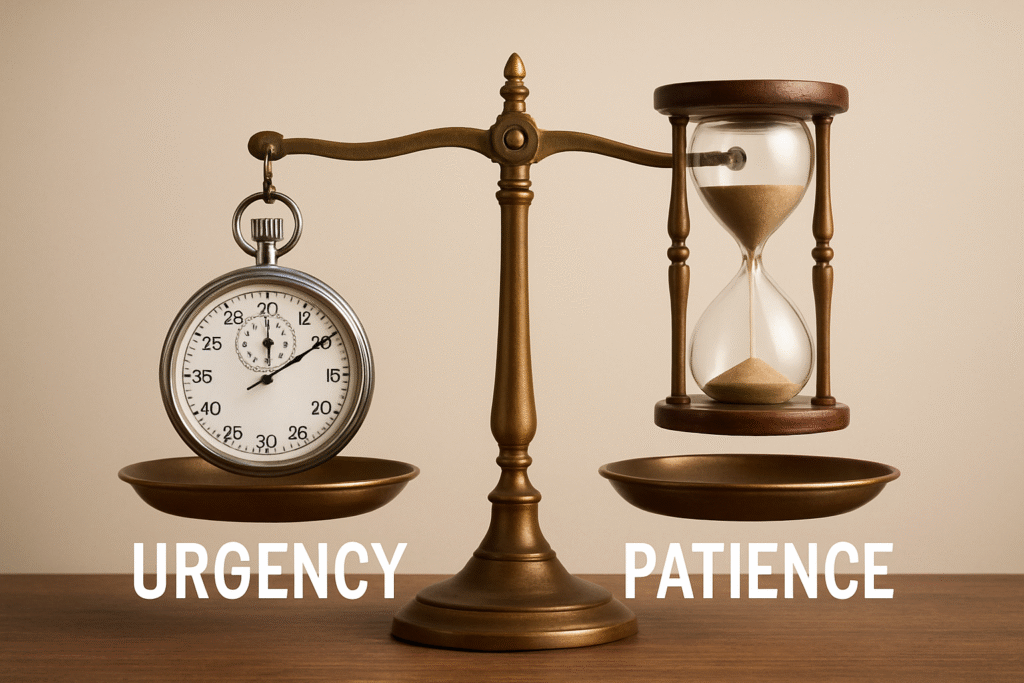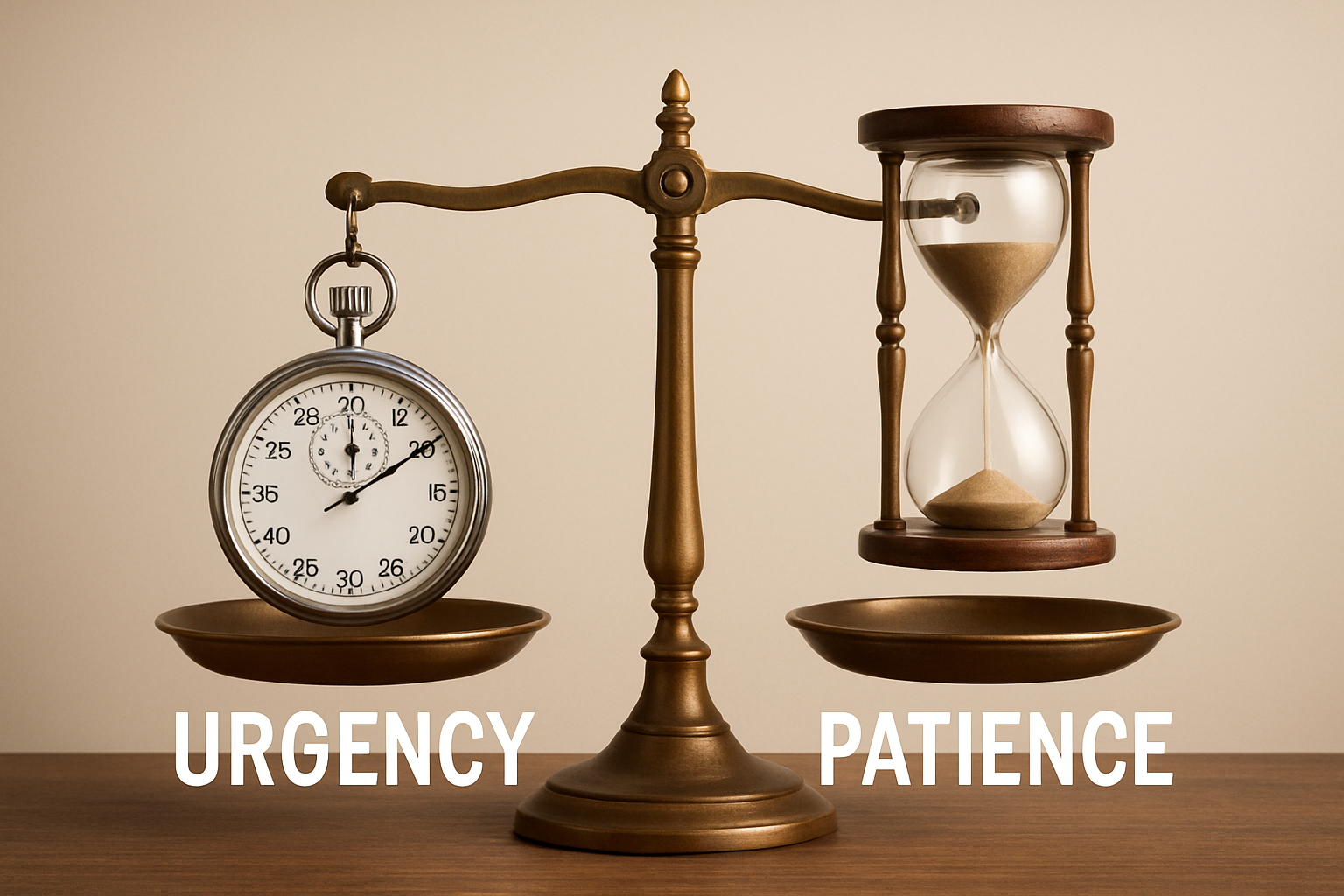Governing in Urgent Times
In today’s political environment, urgency is a constant. Ministers face relentless demands from citizens, media, and stakeholders for quick results. Deputies, as the professional stewards of the public service, must translate this urgency into sustainable organizational action.

Yet transformation, by its nature, requires patience. Major reforms in digital service delivery, regulatory modernization, or cultural renewal often take years to realize. The Minister/Deputy team is therefore caught in a paradox: how to show visible progress quickly without undermining the slower processes of institutional change.
This blog explores how Ministers and Deputies can navigate that paradox, balancing urgency with patience while preserving both political credibility and organizational integrity.
The Political Imperative of Urgency
For Ministers, urgency is not optional—it is the currency of political leadership. Election cycles are short, opposition parties are quick to criticize, and public expectations for government action are immediate.
Urgency communicates:
- Responsiveness – demonstrating that government hears and reacts to citizen concerns.
- Momentum – creating the perception that priorities are advancing.
- Leadership strength – signaling control and decisiveness in uncertain times.
Without urgency, Ministers risk accusations of inertia. Deputies must therefore design responses that demonstrate action, even when long-term change is still in progress (Savoie, 2013).
The Administrative Imperative of Patience
For Deputies, patience is equally non-negotiable. Transforming institutions requires:
- System redesign – adapting structures, policies, and processes.
- Cultural adaptation – shifting mindsets, behaviors, and practices across thousands of employees.
- Capacity building – investing in skills, technology, and governance systems.
These cannot be achieved overnight. Without patience, transformation becomes superficial, creating change fatigue or programs that collapse under weak foundations (Kotter, 2012).
Thus, Deputies must shield their organizations from unrealistic timelines while still supporting the Minister’s need for urgency.
The Minister/Deputy Paradox
The paradox of urgency and patience is not a contradiction—it is a leadership duality that must be actively managed. Ministers need Deputies to create space for deeper change, while Deputies rely on Ministers to sustain political cover during long implementation cycles.
Key tensions include:
- Visible wins vs. structural reform – Ministers want tangible progress; Deputies know structural reforms take time.
- Quick decisions vs. thoughtful policy design – Ministers must decide rapidly; Deputies must ensure durability.
- Short-term optics vs. long-term integrity – Ministers are judged at the next election; Deputies safeguard the institution beyond political cycles.
Effective Minister/Deputy teams navigate these tensions by aligning expectations and clearly communicating trade-offs (Bakvis, 2013).
Strategies for Balancing Urgency and Patience
- Deliver “Quick Wins” Without Compromising Fundamentals
Ministers need visible progress early. Deputies can design initiatives that provide symbolic or practical quick wins (pilot programs, service improvements, or regulatory streamlining) while laying groundwork for longer-term reforms. - Build Dual Timelines
Create two streams of reporting: a short-term political timeline (6–18 months) for Ministers, and a long-term institutional timeline (3–5 years) for transformation. This duality ensures both expectations are managed transparently. - Use Narrative Leadership
Ministers can frame early wins as “steps on a journey” rather than complete solutions. Deputies can support with evidence and storytelling that highlights progress while keeping focus on longer-term outcomes (Denhardt & Denhardt, 2015). - Leverage Independent Validation
Deputies can strengthen credibility by using external advisory reports, independent evaluations, or stakeholder consultations. This reassures Ministers that patience is justified and builds public trust in the process. - Practice Joint Accountability
Ministers and Deputies must present a united front. Blame-shifting undermines both urgency and patience. Jointly owning progress—whether rapid or incremental—reinforces the credibility of both the political and administrative leadership.
Case Example: Health System Transformation
A provincial government launched a major health transformation to integrate digital records and streamline service delivery. The Minister promised citizens “visible results within 18 months.”
The Deputy supported this by:
- Delivering quick wins: launching a new online booking system and reducing wait times for lab results.
- Managing expectations: explaining that full system integration would take 3–5 years.
- Framing success: communicating early achievements as the “first phase” of a longer journey.
This balance of urgency and patience allowed the government to satisfy political pressure while maintaining institutional credibility.
The Risks of Imbalance
When urgency dominates without patience:
- Initiatives are rushed, leading to poor design and implementation.
- Civil servants experience burnout and disengagement.
- Programs collapse when initial momentum fades.
When patience dominates without urgency:
- Citizens perceive inaction, eroding public trust.
- Ministers lose political credibility.
- Transformation stalls as urgency dissipates.
Both extremes jeopardize success. Leadership lies in balancing the paradox.
The Cultural Dimension: Modeling Urgency and Patience
Minister/Deputy teams shape organizational culture. If urgency is modeled without patience, the culture becomes reactive. If patience is modeled without urgency, the culture becomes complacent.
The strongest cultures emerge when urgency and patience are seen as complementary: urgency energizes, while patience sustains. Leaders who embody both create resilient organizations capable of delivering transformation under political and administrative constraints (Heifetz, Grashow, & Linsky, 2009).
Independent Support in Managing the Paradox
Independent advisors, coaches, or transformation partners can help Minister/Deputy teams navigate urgency and patience by:
- Designing dual-track strategies that deliver quick wins and long-term outcomes.
- Providing neutral analysis that strengthens trust between political and administrative leaders.
- Facilitating dialogue between Ministers, Deputies, and stakeholders to align expectations.
External support acts as a buffer, reducing tension and reinforcing shared leadership.
Conclusion: Leadership Through Duality
Urgency and patience are not opposites; they are the dual engines of successful transformation. Ministers drive urgency to sustain political will. Deputies provide patience to safeguard institutional integrity. Together, they form a partnership that balances speed with sustainability.
In transformation, the paradox is unavoidable—but when managed deliberately, it becomes a powerful leadership advantage.
What’s Next?
Institute X helps Ministers and Deputies manage the paradox of urgency and patience, providing frameworks, facilitation, and independent analysis to support credible transformation.
References
- Aucoin, P. (2012). New Political Governance in Westminster Systems. Public Policy Forum.
- Bakvis, H. (2013). “Prime Minister and Cabinet.” In B. Guy Peters & J. Pierre (Eds.), Handbook of Public Administration (2nd ed.). Sage.
- Denhardt, J. V., & Denhardt, R. B. (2015). The New Public Service: Serving, Not Steering. Routledge.
- Heifetz, R. A., Grashow, A., & Linsky, M. (2009). The Practice of Adaptive Leadership. Harvard Business Review Press.
- Kotter, J. (2012). Leading Change. Harvard Business Review Press.
- Savoie, D. J. (2013). Whatever Happened to the Music Teacher? How Government Decides and Why. McGill-Queen’s University Press.

